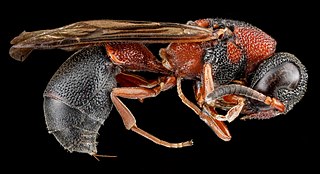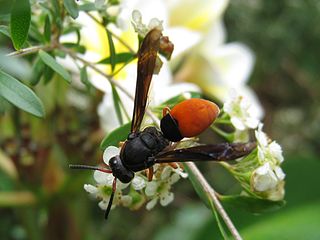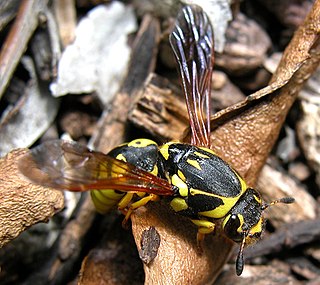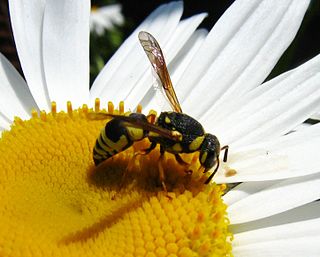
The Euparagiinae are a small subfamily of rare wasps in the family Vespidae containing a single extant genus Euparagia. The group had a cosmopolitan distribution in past geological times extending back to the Early Cretaceous, but is now a geographically relict taxon known only from the desert regions of the Southwestern United States and northwestern Mexico.

Leptochilus is a large, mostly Holarctic genus of small sized potter wasps. The genus reaches its largest diversity in the Palearctic where there are more than 135 species belonging to 5 subgenera. However the division of The division of Leptochilus into subgenera can not be fully supported and the status of some of them is dubious.
Brachymenes is a small neotropical genus of potter wasps currently containing two species, the primarily Andean species B. wagnerianus and the lowland species B. dyscherus.
Incodynerus is an andean neotropical genus of potter wasps currently containing 10 recognized species.

Zethus is a very large, mainly neotropical genus of potter wasps with some species representation also in the Nearctic, Afrotropical, Australian and Indomalayan regions.
Maricopodynerus is a Nearctic genus of potter wasps distributed west of the 100° western meridian in the United States and Mexico. The second metasomal segment, with its tergum much larger than its sternum is an outstanding characteristic of this genus.
Discoelius is a palearctic genus of potter wasps with seven currently known species. It contains the following species:

Pseudabispa is an Australian and Papuan genus of potter wasps containing 5 species, one of them subdivided in 4 subspecies.

Pseudomasaris is a genus of pollen wasps of the family Vespidae, found in arid regions of western North America. They feed their larvae on the pollen and nectar of a variety of plants, though many species prefer flowers in the genus Phacelia. They are colored black with yellow or white markings that, in a few species, resemble the coloration of yellowjackets.

The Bohart Museum of Entomology was founded in 1946 on the campus of the University of California, Davis. The museum is currently the seventh largest insect collection in North America with more than seven million specimens of terrestrial and freshwater arthropods. At least 90% of these holdings are insects. The collection is worldwide in scope with the Western Hemisphere, Indonesia, and Australasia particularly well represented.
Richard Mitchell Bohart was an American entomologist, university professor, and a member of the University of California, Davis Department of Entomology for more than 50 years. He taught courses in general entomology, insect systematics, and summer field courses in insect identification. From 1963 to 1967 he served as chair of the Department of Entomology for the University of California at Davis.

Syneuodynerus is a genus of potter wasps with four species known from Near East, this genus is now regarded as having been synonymised with Euodynerus.
Leucodynerus is a Nearctic genus of small sized potter wasps distributed in south western United States and northern Mexico.

Oreumenes is a small Far East genus of large Eumenes-like potter wasps.

Microdynerus is a genus of potter wasps in the family Vespidae.

Pterocheilus is an essentially holarctic genus of potter wasps with a fairly rich diversity in North America and a single Afrotropical species Pterocheilus eurystomus Kohl 1906 known from Socotra. They are usually rather large wasps characterized by reduced tegulae and prominently pilose labial palpi.
Micralictoides is a genus of sweat bees in the family Halictidae. There are about eight described species in Micralictoides.
Protodufourea is a genus of sweat bees in the family Halictidae. There are about five described species in Protodufourea.

Euparagia is a genus of wasps in the family Vespidae, the only extant genus in the subfamily Euparagiinae.









